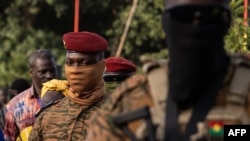Since the offset of jihadist insurgency in April 2015, experts in Burkina Faso argue that the frequency of attacks have risen and are often characterized by massacres in remote villages by highly mobile bands of jihadists traveling on motorbikes.
The Democracy and Human Rights Observatory and a U.S. based NGO, the Armed Conflict Location and Event Data Project (ACLED), said the death toll is approximately 12,000 people.
The human rights groups also said the bloodiest attack were registered on June 4-5, 2021, when 160 civilians were massacred at Solhan, in the northern province of Yagha.
Mahamoudou Savadogo, a security expert said the West African nation experienced an average of 20-30 attacks per week in early 2022, however notes that the figure has increased.
“Today, the rate is ‘30-40’ per week, and the number of affected regions has increased,” said Savadogo.
Jean-Marc Gravellini, a researcher at France’s Institute of International and Strategic Relations (IRIS) said the increased attacks are a result of unemployment in the nation.
“Jihadists exploited landlocked Burkina’s porous borders with Mali to mount cross-border incursions. But the country’s huge population of poor jobless youths also provides the militants with a deep pool for recruitment,” said Gravellini.
Gravellini’s sentiments were echoed by a recent report conducted by the United Nations Development Programme titled “Journey to Extremist in Africa: Pathways to Recruitment and Disengagement.”
Through its report, the UNDP said it interviewed over 2,200 former extremist recruits, some from Burkina Faso, and a quarter cited job opportunities as the primary reason for joining extremist groups.
The UNDP added that 40 percent said they were in urgent need of a livelihood at the time of recruitment.
“Religion came as the third reason for joining,” read the UNDP’s report, adding, “nearly half of the respondents cited a specific trigger event that pushed them to join violent extremist groups, with a striking 71 percent pointing to human rights abuse, often conducted by state security forces.”
Information from this report was sourced from Agence France-Presse and the United Nations Development Programme.








